Steve Addison's Blog, page 20
August 4, 2022
A movement born at midnight
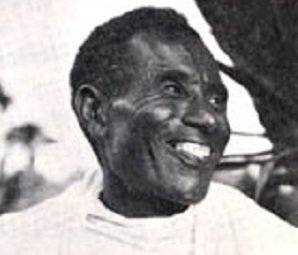
Wandaro Dabaro
I’m working on a book on Acts and the movement of God. I’m looking for stories that show how the realities of Acts are still at work today. Here’s one that got my attention.
When Sudan Interior Mission (SIM) missionaries arrived in 1927 most of the tribes in southern Ethiopia were either Muslim or pagan. They labored for the next ten years and saw 150 disciples formed into three fledgling churches.
Then in 1935 Mussolini’s fascist Italy invaded Ethiopia and the Emperor of Ethiopia, Haile Selassie, fled for England. Two years later the Italians expelled the missionaries.
During the years of occupation SIM received no news from the church in Ethiopia. We now know that the fascists launched a ferocious attack on the new movement. Church leaders were imprisoned. Some were flogged until the flesh was torn from their backs, three died in custody. It seemed that all the fury of darkness had been unleashed. The leaders did not waver, but used their punishment as an opportunity to proclaim the gospel.
Meanwhile local evangelists penetrated deep into the unreached regions. The evangelists were farmers who lived by faith, relying on whatever support other believers could provide. The movement grew rapidly.
Five years later when the Italian forces were driven out they left behind an indigenous movement of churches and 10,000 disciples. By 1943 there were over 200 churches and 25,000 believers. The churches had worked out their own church life and leadership structures. They had no other guide than the instruction from the SIM missionaries to obey what they found in the Word of God.
From the beginning the SIM pioneers determined this would be an indigenous church. The focus of evangelism was not the mission compound but along the roads, under trees and at communal events. Discipleship took place in small informal groups rather than classrooms. The missionaries’ goal was an Ethiopian church led by local elders, not the missionaries. They founded no theological school, church leaders were trained informally through in-depth Bible-studies. There was no salaried clergy but pastor-elders were volunteers living by faith. If there was a church building it was built as a larger version of an ordinary house and paid for by the people themselves.
The SIM missionaries laid the foundation for indigenous church, then at the right time God removed them and the Word multiplied. Back in England, God’s people were united in prayer for Ethiopia, yet they were distressed that their prayers appeared to go unanswered. Meanwhile a national movement of faithful disciples and churches was forged in the fires of persecution.
July 28, 2022
279-Movements Mindset Shifts
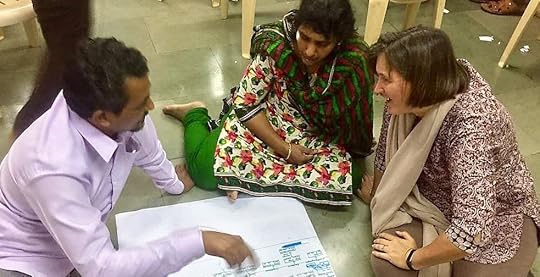
Cindy Anderson talks about the shifts in mindset that need to happen in order to see movements of disciples and churches.
Download Discover Key Mindset Shifts
July 25, 2022
Start with the Early Offer of Prayer
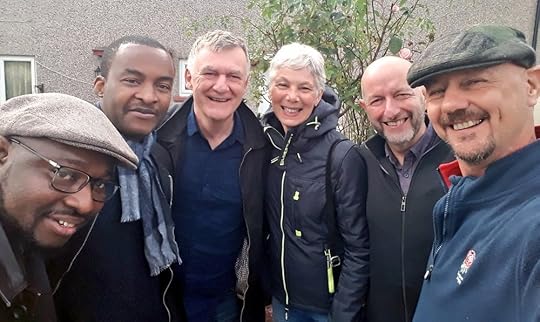
Russell Godward (right) and team.
I’m working on a book on Acts and the Movement of God. My editor rightly points out, I need more contemporary stories that help people bridge the gap between the Book of Acts and our experience. Here’s one of those stories.
John McGinley was the senior ministry of Holy Trinity Anglican in Leicester, England. He’d just returned from meeting with his staff to discuss a proposal that we train people to go into the community offering prayer. It was bad news, “Steve, my team agree this won’t work in England. It may work in Australia, but it’s different here. We will not be welcome if we visit people in their homes.”
Then he added, “On the other hand, nothing is working here, so why don’t we give it a try!”
Two months later we trained seventy-five people from churches in Leicester and around the country to visit homes and pray for people. In five days over 1,200 homes received a visit and of those over 400 welcomed prayer. Most of the others were still happy that we dropped by.
What happens went you offer to pray for people? Here are some responses I’ve had: “Wow, I just got out of jail yesterday and I’m trying to get back together with my partner and two sons. Pray for that.” Or, “Pray for me, my dearest friend died last week.” Or even, “Can you pray I’ll win the lottery!” Or, “I can’t believe it. Yesterday I asked God, if you’re there, send somebody and you turn up!” Or, “No I’m ok thanks.”
All around the world, one of the simplest ways to engage someone in a conversation about Jesus by asking, “Is there anything I can pray for you right now?” It works for people you know and for people you’ve met for the first time.
I was out in the English town of Basildon with my mate Russell Godward. We approached a retired couple who wanted prayer. They’d just come from the hospital where the husband was getting his medication for depression sorted. I shared briefly about my own background with depression. Then he opened his heart and told how twelve months ago their daughter had succumbed to cancer leaving a husband and young family. As I prayed I felt God’s heart for this couple. I shared the gospel. They weren’t ready to take things further but as they drove away the husband looked at me and his face was beaming. God had done something in his life through a simple offer of prayer.
If the Good Shepherd is our model of pastoral ministry, shouldn’t we be out looking for lost sheep? Find a partner and go and do it. Discover that Jesus is already active in the lives of your friends, neighbors and the strangers you meet.
Don’t stop with prayer. If someone wants to know more, explain the gospel to them and invite them to read the Bible with you. Ask three questions: When could we meet? Where could we meet? Who else do you know who would be interested?
Remember, your imperfect start in making disciples always beats someone’s perfect, but untried model.
July 14, 2022
278-Multiplying Disciples and Churches in France
A conversation with Josh and Julie about God’s call to pursue NoPlaceLeft France.
Links
Resources on Relational Oneness
Il l'a dit website (French)
278-NoPlaceLeft France
A conversation with Josh and Julie about God’s call to pursue NoPlaceLeft France.
Links
Resources on Relational Oneness
Il l'a dit website (French)
July 7, 2022
When the Spirit comes

I’m writing a book on Acts and I’m getting input from my editor that it needs work on helping people apply the lessons. Here’s what I wrote originally on the Holy Spirit in Acts . Below is my first attempt at the application side.
There are two opposite errors regarding the work of the Holy Spirit today, one is to confine the work of the Spirit to the pages of Scripture and banish him from contemporary experience. The other is to pursue the individual experience of the Holy Spirit as an end. Luke wrote Acts to remind every generation that the Spirit is given to bear witness to Jesus throughout the world. The one who empowers is also the one who unsettles God’s people, ensuring they remain on the move. We are in as desperate need today for the power of the Holy Spirit as that first generation of disciples. How are we to recognize a true work of the Holy Spirit? When the Spirit moves in power we’ll see the life and ministry of Jesus lived out by disciples in communities, spreading from Jerusalem to the ends of the earth.
It’s over a century since a son of former slaves cried out for a fresh work of the Holy Spirit that would sweep the world. Today his prayers are being answered in the impoverished favelas and prisons of Rio de Janeiro.
Drug gangs rule Rio’s favelas. The police dare not enter. The Rio prison system is an extension of the favelas. The gangs, not the prison officials rule on the inside.
Wherever the gangs are strongest, Pentecostalism thrives. Faith in Christ has enabled these desperate men in appalling conditions to reject death and affirm the right to live. Pentecostalism thrives behind bars because it has adapted to this harsh environment by taking on the structure and function of the prison gangs. The prison churches are run by prisoners. Members are easy to identify: they dress differently, quit drugs, and spend time studying the Bible.
Rio’s most stigmatized residents have built churches where they experience joy, brotherhood, and dignity in one of the city’s most apparently god-forsaken places.
The relationship between Pentecostal churches and the narco-gangs is characterized by respect. The churches treat gang members as people worthy of redemption. The gangs in turn command their members to treat the church members and pastors with respect and to acknowledge their authority in the community.
As long as the Pentecostals are known as a group who practice what they preached, they are protected from prison violence and allowed to occupy space in the prison and in the favelas.
This is Pentecostalism at its best, with its emphasis on the power of the Spirit enabling every believer to bear witness to Jesus in the darkest places resulting in disciples and churches to the glory of God. Yes, the overflow is community impact, but their mission is to make disciples.
June 30, 2022
277-The Movement of God in Acts 2
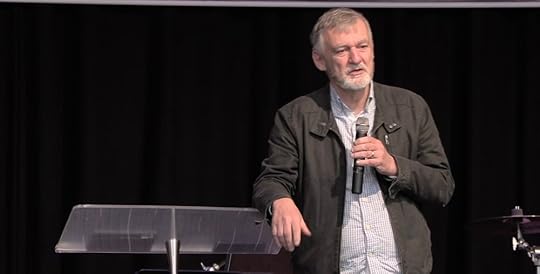
When the Spirit came at Pentecost they asked, "What does this mean?" In this message Steve Addison answers that question.
June 23, 2022
Why another book on movements?

I’m writing a book on Acts and the Movement of God. My editor just asked me, “You’ve already written five books on movements. Why do we need this one?” Here’s what I wrote back.
Acts is the final test of our understanding of our part in God’s mission. If at the end of all our best thinking, strategies, planning, and implementation what we have bears little resemblance to God’s mission revealed in Acts, then we’ve missed it. We’re lost in our own imaginings and feeble efforts.
Acts is the test of whether we’ve got it right. We’re not talking about methods, we’re talking about the nature of God revealed in Jesus Christ and how he works in the world through his people. God hasn’t changed since Luke wrote Acts. Jesus rose from the dead and sent his Spirit upon his disciples with a clear mission in mind. What was true for them remains true today.
I’ve spent my adult life pursuing movements that multiply disciples and churches to the glory of God. I’ve been a practitioner, a trainer, a coach, a podcaster, a researcher and a writer. I’ve wrestled with the case studies from history and around the world. All for nothing, unless what I have aligns with the God revealed in Acts—Father, Son and Holy Spirit—and his mission.
That’s why I wrote this book because every generation must return to the beginning and learn the lessons of Acts. What Jesus began to do and teach in the Gospels continues through his disciples in Acts. The risen Lord leads the way as his Word goes out in the power of the Holy Spirit. There is no wall of division between Luke’s age and ours. Jesus reigns and is present through the Holy Spirit. As his Word goes out, the fruit is always disciples and churches from Jerusalem to the ends of the earth—every people, every place.
Why spend your life on anything else?
June 20, 2022
Acts and the Movement of God

foto credit
Not finding it easy to write a synopsis of my book on Acts for my editor. Here’s what I’ve got so far (unedited!). Let me know what you think.
The one story of Jesus is told in two parts. What Jesus began to do in Luke’s Gospel, he continues to do in the book of Acts. Acts tells the story of how God pursues his mission through his people. Acts is a book about God—Father, Son and Holy Spirit.
The movement of God begins with the risen Lord. When Jesus rises from the dead he confronts a band of disciples in hopeless disarray. He restores them, he gives them their mission and tells them to wait for the Spirit to come in transforming power. The Spirit came at Pentecost and the mission began as the Word went out. Thousands turned and believed and were added to the community of disciples. This was just the beginning.
As the Word goes out in the power of the Spirit, the fruit is disciples and churches to the glory of God from Jerusalem to the ends of the earth—every people, every place.
The life of the first church was characterized by joyful worship and prayer publicly and from house to house. They were devoted to the apostle’s teaching. Their love for one another overflowed in generosity to the poor among them. The church in Jerusalem is an example for every church; it shows us what discipleship in community looks like.
They filled Jerusalem with the knowledge of Jesus. They responded to violent opposition with prayer, forgiveness and bold proclamation of the gospel. Persecution propelled the movement out of the city into Judea and Samaria. God was the initiator of every breakthrough. The risen Lord overwhelmed Saul the destroyer on the Damascus road he called him to open the eyes of both Jews and Gentiles, turning them from darkness to light, from the power of Satan to God, that they may be forgiven and added to God’s people. The Lord sets the parameters of his mission. The Word goes out, the fruit is disciples and churches to the glory of God.
When the mission to the nations stalls, God moves Peter further and further away from Jerusalem into Gentile territory. Finally, when the Spirit falls upon the Gentiles gathered at Cornelius’ house, Peter understands. Gentiles are accepted into the people of God through faith in Christ alone. They do not have to become Jews. It takes time, but eventually, through God’s intervention, the door swings wide open to the Gentile mission.
In Antioch, the Spirit falls upon a band of prophets and teaches fasting and worshipping. Barnabas and Paul are set apart to form a missionary band that will take the gospel to key cities along the trade routes of the eastern Roman Empire. They encounter violent opposition from both Jews and Gentiles, but God protects them. As they proclaim the gospel disciples are made and churches are planted in city after city. Despite the danger, they circle back to strengthen the disciples and appoint local leaders in every place. Only then can it be said that they completed the work the Spirit gave them to do.
After more than a decade Paul could look back and say, there is now no more room for him to work in these regions. He had proclaimed the gospel where it was unknown and planted and strengthened churches where there were none. He trained local leaders. Now he was ready for the next unreached field. This time he planned a mission to Spain via Rome.
Paul says a tearful farewell to the churches in the east and heads to Jerusalem. The Spirit intervenes to warn him that in every city trouble and hardship await him, but God will get him to Rome. In Jerusalem he is attacked by a murderous mob and arrested by the Roman authorities. What follows is two years of legal battles and delays in which his enemies seek to have him either handed over or executed by the Romans. The only way out is for Paul to appeal to Caesar.
There are many more dangers on the voyage to Rome yet Jesus stands by Paul and the gospel goes out to everyone on board and to the barbarian inhabitants of Malta.
Acts finishes with Paul in custody in Rome awaiting trial. He is chained to a Praetorian guard day and night yet the Word still goes out unhindered from the center of the empire to the ends of the earth. Luke doesn’t tell us what happened to Paul in the end. Acts was never about Paul or Peter. Acts is about the living God, revealed in Jesus Christ. Luke tells us how God is at work in the world propelling his Word forward in the power of the Holy Spirit through his people. The Word never stops moving. The Word never takes a backward step. Wherever the Word goes, salvation comes, disciples are made and new churches are formed—from Jerusalem to the ends of the earth. This is the mission of God into which he calls every disciple.
Acts is as relevant today as the living God is relevant today. Acts is not a manual on methods; it’s a book about God. We ignore its message at our peril. Luke does not build a wall of separation between his age and ours. Luke calls every generation back to the beginning, back to the life and ministry of Jesus, shown in Luke’s Gospel and the book of Acts.
If at the end of all of our learning, discussion, creativity and planning, what we have looks nothing like the book of Acts, then we’re in trouble. Acts leads us back to the movement of God for a lost world.
June 15, 2022
276-Multiplying disciples in Utah
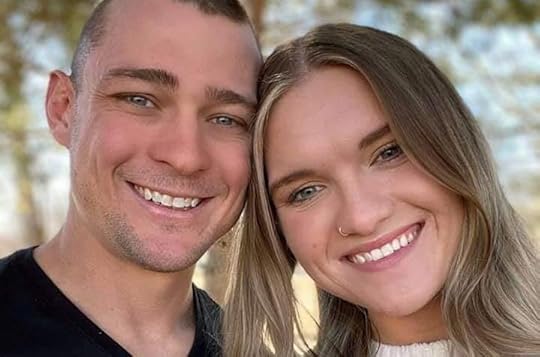
A conversation with Tyler Brown about multiplying disciples in the Mormon heartland.
Related: 254-NoPlaceLeft Utah



